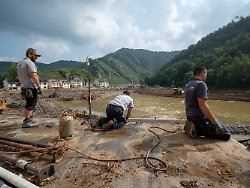Wednesday 4th August 2021
“Call for help” from the Ahr valley
Federal government rejects special commissioner
The federal government does not consider a special commissioner for the flood areas in Rhineland-Palatinate and North Rhine-Westphalia to be necessary. Next week, the head of the Chancellery Braun wants to meet the mayors of the Ahr valley. Meanwhile, the death toll continues to rise.
The federal government has rejected requests from mayors from the Ahr valley for a special representative for the areas affected by the flood. At the same time, the deputy government spokeswoman Ulrike Demmer emphasized that the federal government was firmly on the side of the affected countries and was also involved in “overcoming this extraordinary emergency”.
The creation of a special representative for the flood areas is the central demand from the open letter that 15 mayors had sent to Chancellor Angela Merkel and the Rhineland-Palatinate Prime Minister Malu Dreyer on July 31. The first demand is for a “special representative with very extensive competencies for the reconstruction of the Ahr valley”, to whom a staff of experts should be assigned.
The federal government does not normally comment on open letters, said Demmer. But she could say that Chancellor Helge Braun and the head of the Rhineland-Palatinate State Chancellery will speak to the district administrator and mayors of the Ahrweiler district on Wednesday. The meeting was organized by the Rhineland-Palatinate Ministry of the Interior.
With a view to the demand for a special representative, Demmer referred to the State Secretaries Committee of the Federal Government, which had already been set up for coordination and which had already met twice and was helping to organize emergency aid. No further new institutions have been planned so far, also because the flood aid is primarily the responsibility of the federal states. In addition, next Tuesday at the conference of Chancellor Angela Merkel with the Prime Ministers, in addition to the Corona situation, help for the flood areas will also be about.
Mayors repeat their request
Federal Finance Minister Olaf Scholz also rejected the request for a special representative. “That would increase bureaucratic activity and make things more complicated,” said the SPD politician in the WDR. “I am convinced that the federal states must take this matter into their own hands and be able to rely on the support of the federal government.” Rhineland-Palatinate and North Rhine-Westphalia “should do it directly with the municipalities and districts, and that’s the quickest way.” The federal government will ensure “that the money is available”.
At a press conference on Wednesday, the mayor of the Altenahr community, Cornelia Weigand (non-party) repeated the request. The letter to Merkel and Dreyer was not a fire letter, but a call for help, she emphasized. Once again she listed the demand for a special federal representative as the first point. “It is not about someone withdrawing competencies from other authorities, but rather that there is a corresponding team with special competencies that coordinate these infinitely large measures, these complex measures.”
Meanwhile, the number of people who died in the flood disaster in the Ahr valley rose to 141. Florian Stadtfeld from the Koblenz police headquarters said 115 dead had been identified and 17 people were still missing. On Tuesday the death toll was 139.
At the end of July, the North Rhine-Westphalian Interior Minister Herbert Reul said that there were no longer any missing persons in North Rhine-Westphalia. 47 people were killed there. 23 of them were hit by the water on the streets and died.
The obligation to file for bankruptcy is suspended
The federal cabinet decided on Wednesday to temporarily suspend the obligation to file for bankruptcy for damaged companies. The decision is based on a proposal from the Ministry of Justice, which provides for a suspension retrospectively from July 10th until the end of October. In the meantime, companies should be given the opportunity to take advantage of economic aid.
The regulation is intended for those companies whose insolvency or over-indebtedness is the result of the flood. It is about companies with “viable and successful business models” that would not be threatened with bankruptcy without the storms and for which, according to the draft law, there are “reasonable prospects of restructuring”.
According to Justice Minister Christine Lambrecht, the suspension could be extended again until the end of March 2022 in a second step. The coalition factions are now entrusted with the implementation, after all, the Bundestag still has to pass the law.
As the Federal Ministry of Agriculture announced, farmers affected by the floods are to be supported with another loan program. To this end, a program launched in July together with the Landwirtschaftliche Rentenbank was expanded – businesses particularly affected can apply for loans at the effective interest rate of 0.01 percent. Furthermore, there is therefore the possibility of pausing the repayment of current loans.
.
